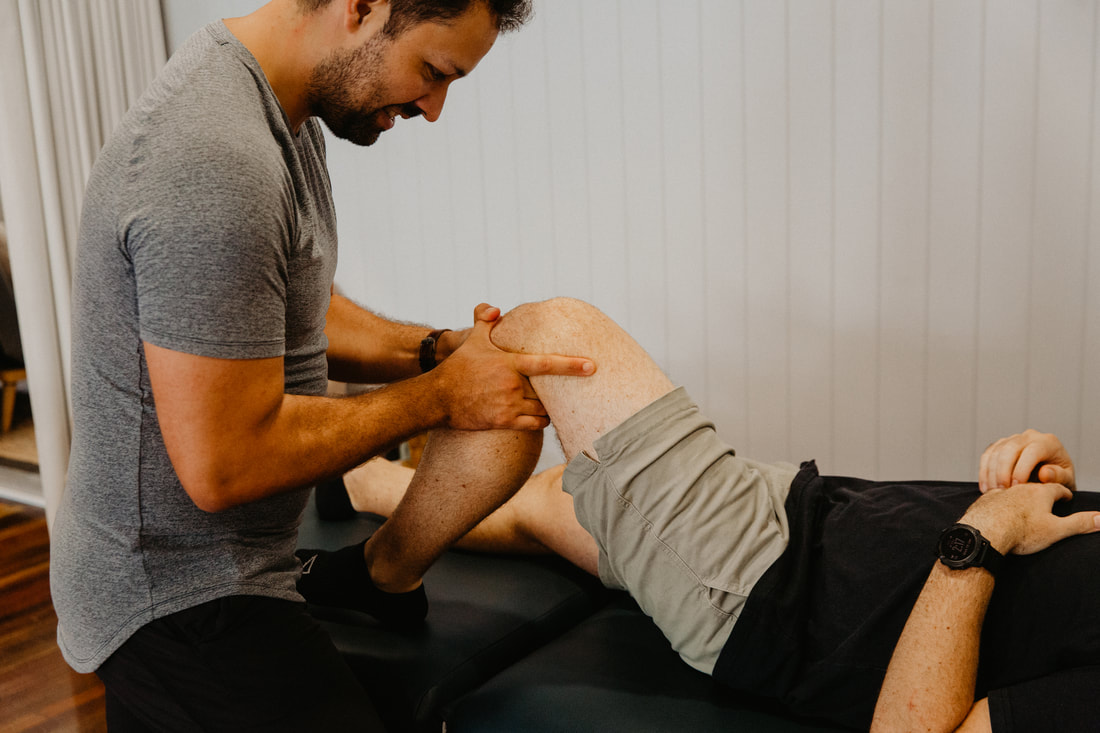Quadriceps Tendon Tear Physiotherapy Brisbane southside.
What is a Quadriceps Tendon Tear?
A quadriceps tendon tear is a significant injury that affects the large muscle group in the front of your thigh, known as the quadriceps, where the tendon that attaches the muscle group to the knee cap tears. The quadriceps muscles are responsible for extending your knee and are essential for activities like walking, running, jumping, and climbing stairs. When the quadriceps tendon tears, it can result in pain, weakness, and difficulty using the affected leg.
What causes a Quadriceps Tendon Tear?
Quadriceps tendon tears are usually the result of a sudden, forceful contraction of the quadriceps muscles, often during activities like jumping or landing where quadriceps undergoes rapid eccentric contraction with planted foot. Other mechanism is caused by a force straight on the front side of the knee such as fall. They can also occur due to chronic degeneration, especially in older individuals.
What are the symptoms of a Quadriceps Tendon Tear?
Common symptoms of a quadriceps tendon tear include sudden and severe pain in the front of the thigh or knee, swelling, bruising, and an inability to straighten the knee or support weight on the affected leg.
How is a Quadriceps Tendon Tear diagnosis?
A physician will typically perform a physical examination, and imaging tests like an MRI or ultrasound may be ordered to confirm the diagnosis and assess the extent of the tear.
What is the treatment for a Quadriceps Tendon Tear?
What is the prevention for a Quadriceps Tendon Tear?
Strengthening exercises, proper warm-up, and conditioning can help reduce the risk of quadriceps tendon tears. It's also important to use proper technique when engaging in activities that put strain on the quadriceps.
How can physiotherapy help with a Quadriceps Tendon Tear?
Physiotherapy plays a crucial role in the rehabilitation process after a quadriceps tendon tear, whether you undergo surgical or non-surgical treatment. The primary goals of physiotherapy for a quadriceps tendon tear are to reduce pain, restore strength and function, improve range of motion, and facilitate a safe return to daily activities and sports. Here's how physiotherapy can help with a quadriceps tendon tear:
If you or a loved one has questions about Quadriceps Tendon Tear and how our physiotherapists might be able to help please call us on 07 3706 3407 or email [email protected]. We would love to work with you!
A quadriceps tendon tear is a significant injury that affects the large muscle group in the front of your thigh, known as the quadriceps, where the tendon that attaches the muscle group to the knee cap tears. The quadriceps muscles are responsible for extending your knee and are essential for activities like walking, running, jumping, and climbing stairs. When the quadriceps tendon tears, it can result in pain, weakness, and difficulty using the affected leg.
What causes a Quadriceps Tendon Tear?
Quadriceps tendon tears are usually the result of a sudden, forceful contraction of the quadriceps muscles, often during activities like jumping or landing where quadriceps undergoes rapid eccentric contraction with planted foot. Other mechanism is caused by a force straight on the front side of the knee such as fall. They can also occur due to chronic degeneration, especially in older individuals.
What are the symptoms of a Quadriceps Tendon Tear?
Common symptoms of a quadriceps tendon tear include sudden and severe pain in the front of the thigh or knee, swelling, bruising, and an inability to straighten the knee or support weight on the affected leg.
How is a Quadriceps Tendon Tear diagnosis?
A physician will typically perform a physical examination, and imaging tests like an MRI or ultrasound may be ordered to confirm the diagnosis and assess the extent of the tear.
What is the treatment for a Quadriceps Tendon Tear?
- Non-surgical: Partial tears may be treated non-surgically with rest, physical therapy, and immobilisation with a brace for 3-6 weeks. This approach is typically reserved for less severe cases.
- Surgical: Complete tears often require surgical repair. The surgeon will reattach the torn tendon to the patella using sutures, screws, or other fixation devices. The knee is then immobilised for 3-6 weeks. Post-operative physical therapy is crucial for rehabilitation.
What is the prevention for a Quadriceps Tendon Tear?
Strengthening exercises, proper warm-up, and conditioning can help reduce the risk of quadriceps tendon tears. It's also important to use proper technique when engaging in activities that put strain on the quadriceps.
How can physiotherapy help with a Quadriceps Tendon Tear?
Physiotherapy plays a crucial role in the rehabilitation process after a quadriceps tendon tear, whether you undergo surgical or non-surgical treatment. The primary goals of physiotherapy for a quadriceps tendon tear are to reduce pain, restore strength and function, improve range of motion, and facilitate a safe return to daily activities and sports. Here's how physiotherapy can help with a quadriceps tendon tear:
- Pain Management: Physiotherapists can employ various modalities such as ice, heat, or electrical stimulation to help manage pain and inflammation in the early stages of recovery or after surgery.
- Immobilisation and Protection: If you've had surgery, your physiotherapist will guide you on how to properly use a brace or immobiliser to protect the repaired tendon. This ensures that the healing process is not compromised.
- Range of Motion (ROM) Exercises: Gentle, controlled movements are introduced to prevent joint stiffness. Initially, passive ROM exercises may be used to move the knee without using your own muscle strength. As healing progresses, active ROM exercises will be introduced.
- Strengthening Exercises: Strengthening the quadriceps and surrounding muscles is crucial for regaining function and stability. Initially, isometric exercises (contracting the muscle without joint movement) are used, followed by progressive resistance exercises as healing allows.
- Functional Training: Physiotherapists work on specific functional activities such as walking, climbing stairs, and squatting to help you regain the ability to perform daily tasks and return to your desired level of physical activity.
- Balance and Proprioception Training: These exercises help improve joint stability and reduce the risk of re-injury by enhancing your body's ability to sense its position in space.
- Gait Training: Learning to walk with proper mechanics and without limping is an important part of rehabilitation. Your physiotherapist will help you achieve a normal gait pattern.
- Plyometric and Sport-Specific Exercises: Athletes may need specialised training to return to their sports safely. Plyometric exercises and sport-specific drills are incorporated gradually to prepare the knee for higher-level activities.
- Education: You'll receive guidance on proper body mechanics, posture, and techniques to prevent future injuries. Your physiotherapist may also provide advice on nutrition and lifestyle factors that can aid in recovery.
- Progress Monitoring: Regular assessments are conducted to track your progress and adjust the treatment plan accordingly. This ensures that you are meeting your rehabilitation goals.
- Home Exercise Program: You will be given a personalised home exercise program to complement your in-clinic sessions. Consistency with home exercises is crucial for a successful recovery.
- Pain Management Techniques: Physiotherapists can teach you pain management techniques such as manual therapy, massage, or taping to alleviate discomfort and improve tissue healing.
- Psychological Support: Recovering from a quadriceps tendon tear can be mentally challenging. Physiotherapists provide emotional support and motivation to help you stay positive and committed to your rehabilitation.
If you or a loved one has questions about Quadriceps Tendon Tear and how our physiotherapists might be able to help please call us on 07 3706 3407 or email [email protected]. We would love to work with you!
Who to book in with:
Yulia Khasyanova
|
Emma Cameron
|
Mauricio Bara
|



